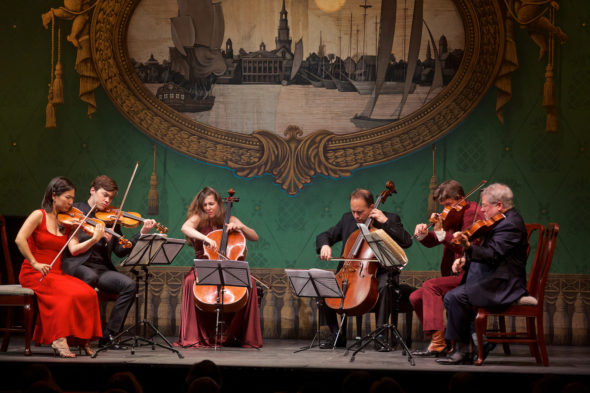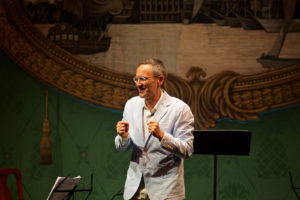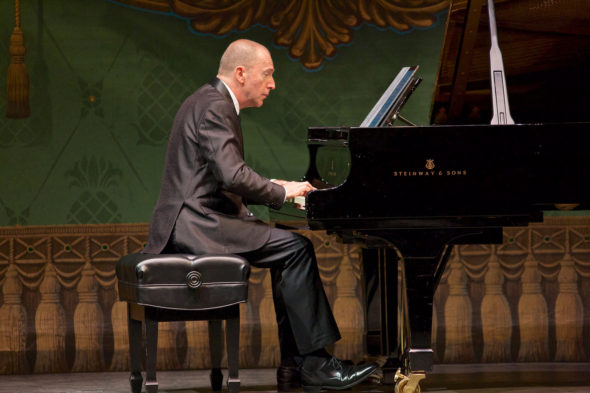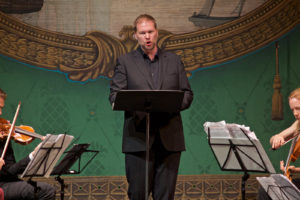
L-R: Livia Sohn (violin), Benjamin Bielman (violin), Alisa Weilerstein (cello), Christopher Costanza (cello), Geoff Nuttall (viola), and Daniel Phillips (viola) performing Tchaikovsky’s Souvenir de Florence.
By Stacy Huggins | Images by William Struhs, courtesy Spoleto Festival USA
Besides the unparalleled music, the best part of attending a Spoleto Festival Chamber Music Concert is undoubtedly Geoff Nuttall, The Charles E. and Andrea L. Volpe Director for Chamber Music.
Having never met him in person, this is all taken from observation during his on-stage performances. He is unflappable, insanely knowledgeable, and hilarious. His passion for chamber music exudes from his very being, and it’s that quality that makes the Spoleto Chamber Music series a perennially popular event.
Every single concert that I have attended has included a free lesson in chamber music history and execution. The consummate teacher, Nuttall will not let a soul out of the Dock Street Theatre until they have learned something new about chamber music or listened to a composer they’ve not heard before. This is a space for exploration and education.
Nuttall programs old alongside new, contemporary alongside historic. And believe it or not, being a living artist does not equal being a Contemporary artist. That’s your free lesson from the Art Mag today.
Nuttall recruits the top talent in chamber music to play the Spoleto series and unabashedly surrounds himself with musicians he claims are much more talented than he–although we’re inclined to believe that he is one of the very best violinists around. So often, these virtuosos will be made up of husband and wife duos, like Nuttall and his own wife, violinist Livia Sohn, who is as masterful as she is beguiling. Tara Helen O’Connor is an superior flutist whose husband Daniel Phillips “bats both ways,” as Nuttall joked–meaning only that he plays both the violin and viola with extraordinary skill. He started off playing the violin, but when he realized that he could just rent a viola alongside owning his violin, he continued learning to play both until he was ready for his first viola. His stringed instrument collection is sure to be a little more extravagant now.
Program VII opened with the “Gypsy Sonata” by George Phillipp Telemann (1681-1767), whose legacy has not been well remembered, for no good reason at all Nuttall muses. Telemann’s contemporaries and close friends Johann Sebastian Bach and George Frederic Handel seem to get all the attention, while one could “select any of Telemann’s compositions at random and it would be pretty good.
buy synthroid online https://cpff.ca/wp-content/languages/new/canadaa/synthroid.html no prescription
”
The “Gypsy Sonata” most closely follows my definition of chamber music, due in large part to the presence of the harpsichord, brilliantly played by Pedja Muzijevic. Christopher Costanza fills out the bass line on cello, adding a richness to the sound that creates vibrant colors where it would have been a little pale otherwise. Phillips is soulful and profound on the violin, but it is Tara Helen O’Connor who shines with shimmering, lilting notes, and an enchanting sound. O’Connor has incredible breath control that never once compromises the integrity of the piece and shows what an excellent musician she is. She so embodies perfection on the flute that you’ll forget she is human and therefore obliged to breath at regular intervals for survival. It was very difficult not to stand and clap with gusto for her playing after the second movement came to a close.
Next, baritone Tyler Duncan (“The Thor of Baritones,” Nuttall jokes) and pianist Inon Barnatan performed two songs composed by Franz Schubert (1797-1828). Duncan sang them masterfully, and since I don’t speak German I was grateful for the song texts in the back of the program. “Wandrers Nachtlied” was over before I could figure out where I was looking for the text. “Der Erlkönig” is a beautiful yet unnerving tale of a young boy being spirited away by the Alder King, right from his father’s very arms–a terrifying thought to any parent, as one of the musicians pointed out. As Nuttall quipped, it’s unfortunate that the last words Duncan uttered on stage of Spoleto 2016 were “war tot,” (was dead) but Duncan gave a moving performance.
During his introduction of Quintet by composer Sean Shepherd (b. 1979), Nuttall snuck in a basketball analogy that likened the virtuoso playing of the musicians to basketball phenom Steph Curry and his three-pointers…but something tells me that joke was lost on this audience primarily composed of older, Caucasian patrons. When the bulk of your performances take place midday during the work week, it’s difficult to capture a diverse audience. Most of us working stiffs don’t have the luxury of cutting out for an hour and fifteen minutes of transcendent music. #Goals.
M.A.S.T.: Musician Audible Super Titles. Nuttall feels a trend coming on here. Before each of the five movements, a different member of the quintet announced the name and direction for each work. “Ceremonial, lofty;” “Insistent, nasal, snarling, relentless;” “Remote, distant, elsewhere;” “Hissy fit,”–brilliantly demonstrated by Todd Palmer; and “Strictly lazy.” Excepting the final piece, each was an apt description of the sound, sound quality, and attitude of the respective movement. There was nothing that felt lazy about the final piece, but perhaps it was an accurate description simply marred by the negative connotation of the word ‘lazy.’ The musicians were enlightened, and played with great synchronicity.
The final work, “Cello Sonata, Opus 6” by Samuel Barber (1910-81), featured cellist Alisa Weilerstein with Inon Barnatan on piano for an expressive and emphatic termination point to the concert. Barnatan plays with great determination and deliberate fingering, which plays beautifully off Weilerstein’s expressive and dramatic movements. Weilerstein almost seems like an entirely different being, and playing with such emotion that she often drops her left hand from the neck of the cello as her bow slides the last of a note across the strings. Collectively, they transport their audience to another time and dimension where nothing exists but the music.
The concert wrapped on that definitive musical peak, with every audience member on their feet.
Chamber Music performances take place daily at 11am and 1pm at Dock Street Theatre.
buy nolvadex online https://cpff.ca/wp-content/languages/new/canadaa/nolvadex.html no prescription
Purchase tickets.
http://rxbuywithoutprescriptiononline.net/propecia.html
https://vifreepress.com/wp-content/languages/new/cozaar.html
Clomid no Prescription
Categories: Performing Arts, Review
Tags: Alisa Weilerstein, Chamber Music, Christopher Costanza, Daniel Phillips, Der Erlkönig, Geoff Nuttall, George Phillipp Telemann, Inon Barnatan, Livia Sohn, Pedja Muzijevic, Samuel Barber, Sean Shepherd, Tara Helen O'Connor, Todd Palmer, Tyler Duncan








Comments (0)
No comments yet
The comments are closed.